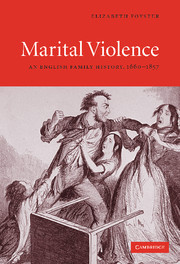Book contents
- Frontmatter
- Contents
- Preface
- Abbreviations and conventions
- Introduction
- 1 Rethinking the histories of violence
- 2 Resisting violence
- 3 Children and marital violence
- 4 Beyond conjugal ties and spaces
- 5 The origins of professional responses
- Conclusion: The 1857 Divorce Act and its consequences
- Bibliography
- Index
2 - Resisting violence
Published online by Cambridge University Press: 18 December 2009
- Frontmatter
- Contents
- Preface
- Abbreviations and conventions
- Introduction
- 1 Rethinking the histories of violence
- 2 Resisting violence
- 3 Children and marital violence
- 4 Beyond conjugal ties and spaces
- 5 The origins of professional responses
- Conclusion: The 1857 Divorce Act and its consequences
- Bibliography
- Index
Summary
Rachael Norcott first fled from her husband John's violence in 1664, when she sought refuge with one of her sisters. John found her there, and facing criticism for his behaviour from Rachael's family and friends, dramatically wished, ‘that his tongue might rot out if ever he abused her again’. Such words appear to have persuaded Rachael to return to her husband, for she was to endure another two years of violence before she began separation proceedings.
Asking why women remain with violent men is a question that is frequently asked today, but this is in a society where divorce is widely available. During the period of this study, divorce was not possible on the grounds of violence, and there were many economic and social factors that acted to dissuade women from pursuing a marriage separation on the basis of cruelty. Thus, even if their personal safety was at risk, some women calculated that it was not in their best interests to leave. From the Restoration to the mid-nineteenth century, a more relevant enquiry was not why women stayed with violent husbands, but how women learnt to cope with their violent partners. Thus on 12 March 1789 one London debating society considered the motion, put forward by ‘a young lady’, whether ‘a Lady that is married to a tyrannical husband be more likely to promote her own happiness by a spirited opposition, or a patient submission to his temper and conduct?’
- Type
- Chapter
- Information
- Marital ViolenceAn English Family History, 1660–1857, pp. 84 - 128Publisher: Cambridge University PressPrint publication year: 2005

